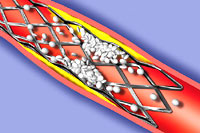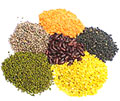|
|
Diet to Prevent Thrombosis
 A
diet that is low in saturated fats, high in
fibre and contains plenty of fruit
and vegetables helps to reduce the risk of
atherosclerosis, a form of
heart
disease, in which fatty deposits build up in the linings of the blood vessels.
This can lead to thrombosis, which occurs when one of the fatty plaques narrow a
blood vessel and a blood clot or thrombus, forms, blocking the flow of blood. A
diet that is low in saturated fats, high in
fibre and contains plenty of fruit
and vegetables helps to reduce the risk of
atherosclerosis, a form of
heart
disease, in which fatty deposits build up in the linings of the blood vessels.
This can lead to thrombosis, which occurs when one of the fatty plaques narrow a
blood vessel and a blood clot or thrombus, forms, blocking the flow of blood.
A thrombosis is the formation of a blood clot in a
blood vessel.
|
|
Cut down on food high in saturated fat, such as dairy products, as well as
foods that have a high salt content (which can raise
blood pressure), such as
yeast extract, bacon or sausages.
The risk of thrombosis increases with age, while other factors known to make
it more likely include obesity.
HELPFUL FOODS :
Not all fats are bad for you, however. Some polyunsaturated fats contain omega-3
fatty acids which make blood platelets less 'sticky' - so helping to prevent
blood clots. They are found in oily fish such as mackerel, herring and trout.
Try to eat a meal including one of these fish two or three times a week.
Raw onion is thought to guard against the harmful effects of fatty foods by
increasing the rate at which blood clots are broken down.
 Fresh
garlic is also thought to reduce the risk of blood clots. However, you would
have to eat ten or more cloves a day for a significant effect. Fresh
garlic is also thought to reduce the risk of blood clots. However, you would
have to eat ten or more cloves a day for a significant effect.
EAT PLENTY OF:
-
 Oily
fish, for omega -3 fatty acids Oily
fish, for omega -3 fatty acids
-
 Oat
bran and pulses for fibre Oat
bran and pulses for fibre
-
 Onions
and garlic which may help to prevent blood clots Onions
and garlic which may help to prevent blood clots
CUT DOWN ON :
-
 Animal
and dairy products which are high in saturated fats and
cholesterol Animal
and dairy products which are high in saturated fats and
cholesterol
-
 Salt,
which raises blood Salt,
which raises blood
-
 Alcohol,
and stimulants like coffee should be avoided Alcohol,
and stimulants like coffee should be avoided
REDUCING THE RISKS
:
 The
key of avoiding thrombosis is a diet low in saturated fat and high in fibre and
omega-3 fatty acids found in some oils and oily fish. Relaxation techniques
including yoga, meditation, guided imagery, biofeedback, and counseling and
other "talking" therapies may also be useful to prevent or slow the progress of
Atherosclerosis. The
key of avoiding thrombosis is a diet low in saturated fat and high in fibre and
omega-3 fatty acids found in some oils and oily fish. Relaxation techniques
including yoga, meditation, guided imagery, biofeedback, and counseling and
other "talking" therapies may also be useful to prevent or slow the progress of
Atherosclerosis.
Related Links
|
|
|
|
|









